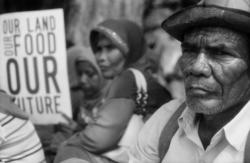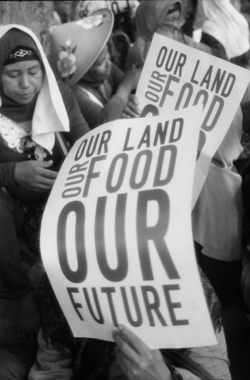
Agrarian Problems Emerge as Corporations use MIFEE Project for Capital Accumulation.
To failitate these large-scale food commodity enterprises, there is a need for supporting infrastructure to produce and distribute food and to bring it to market. The government is pushed to ensure there are policies, programmes and funding for this infrastructure development. In the case of Indonesia, the government has published the MP3EI ( Master Plan for the Acceleration and Expansion of Indonesian Economic Development) for economic planning until 2025. Finance for MP3EI projects could come in the form of loans (“debt”) granted to the Indonesian government by financial institutions, the majority of which are owned by transnational companies.
MIFEE and MP3EI was the hottest topic at a panel discussion organised by PUSAKA, SAINS and IHCS, in connection with the Consortium on Agrarian Reform’s National Forum (Munas KPA), on 25th February n the Green Hotel, Cisarua, West Java.
People attending the discussion took a sceptical approach, considering the food crisis as an excuse, deliberately created so that corporations could assert control over the necessary business which is central to most people’s lives. “Is it true that we are facing shortages of food, energy etc., even on a global scale? Or are those two commodities, which are currently so expensive, giving corporations a monopoly over land and distribution? This is something which needs our close attention”, asked Rahmat, the general Secretary of AGRA. Rahmat believes that the global food and energy crisis has been caused by an accumulation of capital, by the same people who are make the crisis appear legitimate in order to increase their monopoly over land.
In the case of MIFEE, around 62 private companies are involved and control over two million hectares of land, which includes industrial forest plantations, oil-palm plantations and food crops.
In the same meeting, the Executive Chair of IHCS, Gunawan, was worried that MIFEE will have tragic effects on local people, similar to what the Amungme and Komoro people have already experienced in the Freeport case. “MIFEE comes from a kind of capitalism where capital accumulation by corporations causes the classic agrarian problem: the expropriation of land. I fear that the negative effects of MIFEE will be even worse than Freeport.
The pattern of large-scale land expropriations, capital-intensive and using modern technology, has been going on for some time and continues to cause an extraordinary amount of damage. MIFEE will threaten the sustainability of the Malind people’s livelihood in Merauke, and destroy their eonomic, social and cultural systems.
A Malind woman, Rosa Moyuend, explained this point. Attempts to destroy the Malind people’s customs, economy, culture and social structure commenced in the Dutch colonial era. Specifically, in 1939, Merauke was the site of a development project designed to feed the South Pacific known as Padi Kumbe.
According to Rosa, the Dutch introduced immigrants from outside Papua which destroyed the Malind way of life by changing patterns of consumption. “Malind people who as far as I know have always eaten sago, were forced to eat rice under the colonial system.” At the same time the land with the sago trees was cleared for the project to create this reserve of food crops. This brought about both a physical and identity crisis for the Malind.”
Rosa explained that this change in the consumption pattern had a genetic effect. Previously, she continued, Malind people were known as being big and tall. Nowadays however, their body shape has changed. Looking at Malind people’s physical characteristics nowadays, they still have long bones, but it is out of balance with their smaller body structure. Aside from this, Papuans have lost their cultural and customary identity.
Rosa is worried that the effects of MIFEE and the governments methods of enforced development will not deliver security or freedom, and falls a long way short of meeting the aspirations of the Malind people and Papuans in general.
How should development take place for the Papuan people? There needs to be a deeper understanding of Papuan people’s lives and a change in the development paradigm that meets their needs. There must be determined and serious efforts to recognise, protect, respect and restore the people’s rights, and also to set Papua’s political history straight.
Source: Pusaka http://pusaka.or.id/2013/02/proyek-mifee-untuk-akumulasi-modal-korporasi-dan-menimbulkan-permasalahan-agraria-di-tanah-papua.html













